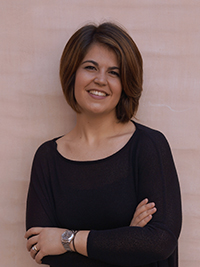Valentina Frighi

XXXII Cycle - (A.A. 2016-2017)
IDAUP
Home Institution: University of Ferrara
Scholarship
Curriculum: Architecture (ICAR12)
Research Topic: Building technologies and materials
Tutor DA-UNIFE: Giovanni Zannoni
Tutor Polis University: Arben Shtylla
External Expert: Fabio Conato
Nationality: Italian
Email: frgvnt@unife.it
Profile
Biography
Born in Ferrara in 1989, Valentina studied in Architecture at the University of Ferrara, where she graduated with the highest mark in 2013.
After the authorization to practice, Valentina started her career as architect as within the University, collaborating in activities on topic related to architectural design and technology.
In 2015 she was appointed “Expert on the subject” for the SSD-ICAR/12; in 2016 she won a research fellow grant entitled “Building envelope and non-linear performance: new components, new tools for design, construction and monitoring”, after which she has been accepted, following a selection procedure at the IDAUP International PhD Programme, where she is currently occupied.
During these years, Valentina has been author of a scientific monograph and of many contributes in journals and volumes. Further, she collaborates in national and international research projects, she acts as a reviewer and has been part of scientific committees of different conferences.
Research skills
Building Envelope | Building Materials & Components | Architectural Technology | Environmental Design | Building Performance
Scientific activities
ORCID ID:
0000-0002-9082-8746
IRIS UNIFE ID:
rp00728
Doctoral research
Smart Architectures: a revolution in the built environment
Adaptive (transparent) components for the improvement of building envelope performance
Building process has recently undergone a real revolution, becoming fertile ground for experience new building materials and technologies equipped with high-performance, reduced-dimensions and unconventional features. Thanks to the rise of automation, interests of various disciplines have been directed towards a new generation of smart buildings, capable of react to the external variability and to the ever-changing needs of end-users. In this transition from a traditional to a fully-integrated smart building, smart materials and components play a significant role. Although the increasing development of the industrial sector and the use of such advanced technologies, heat and gain losses through windows are still significant, being them the weakest point of the whole building envelope system. Therefore, the current research aim at investigate the role that innovative technologies have in architecture, investigating the way they influence building systems’ behaviour and showing how the relationship between advanced materials, technologies and architecture could become a key driver for innovative building design concepts, thanks to the possibilities offered to define new architectural languages. This main scope is further reduced by concentrating the investigation on the world of transparent building components to understand the way in which technologies coming from different sector may allow optimization, control and monitoring of their performance, making them adaptable to the variability of boundary conditions thus allowing a global implementation of the whole envelope performance.
Keywords
Building Envelope | Building Materials and Components | Advanced and Innovative Materials and Technologies | Smart Materials | Smart Windows

